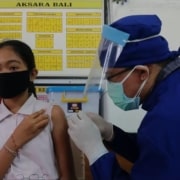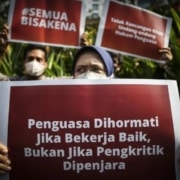
Photo by M Risyal Hidayat for Antara.
In the three elections since Indonesia has been holding direct presidential elections – 2009, 2014 and 2019 – there have been only two candidates for the top job. But when registration opens on 19 October 2023, is it likely we will see three people vying for the top job: Prabowo Subianto, Ganjar Pranowo and Anies Baswedan.
This makes a run-off election between the top two candidates more likely. Recent opinion polls indicate Anies is unlikely to make the second round of presidential candidates. But, regardless, he seems determined to stay in the running, with support from the Coalition of Change for Unity. This is made up of the National Democrat Party (NasDem), the Prosperous Justice Party (PKS), and the Democratic Party (Partai Demokrat).
So, who is Anies, and why is he so determined to stay in the race?
Life before politics
Anies was born in 1969 in Kuningan, West Java, and is therefore of a similar age to Ganjar (born 1968). But unlike Ganjar or Jokowi, Anies comes from a family that is well-established in society, as does Prabowo.
Anies’ grandfather, Abdurrahman Baswedan, was a journalist and cabinet minister during the Indonesian Revolution. His parents were both academics – his father, Rasyid Baswedan, was a former rector of the Islamic University of Indonesia in Yogyakarta.,Anies’ wife, Fery Farhati Ganis, is an early childhood educator.
Anies attended state primary and secondary schools but also spent a year as an AFS exchange student in Milwaukee, Wisconsin. He graduated with a bachelor’s degree in business management from Gadjah Mada University in Yogyakarta in 1995, before obtaining a Master of Public Management in international security and economic policy from the University of Maryland (as a Fulbright scholar) in 1998, and a PhD in political science from Northern Illinois University in 2005.
Anies first came to national attention in 2007, when he succeeded the influential Islamic scholar Prof Dr Nurcholis “Cak Nur” Madjid as rector of Paramadina University in Jakarta, a leading private Islamic university. During his time at the helm he instituted a fellowship to support students from lower socio-economic backgrounds.
In 2009, Anies set up the Indonesia Mengajar Foundation, which supports young graduates to teach for a year in disadvantaged and remote parts of Indonesia. As Baswedan’s education career flourished, he garnered national acclaim that paved the way for his transition into political life.
A politician is born
In 2013, Anies was appointed to the transitional cabinet for the president-elect, Joko Widodo. He went on to become the Minister of Education and Culture in 2014, part of President Joko Widodo’s Working Cabinet. Anies made changes to the curriculum and established a teacher competency test to improve the quality of teachers.
However, in 2016, Anies and Jokowi seemed to fall out. Anies was fired amid criticism of his performance and accusations he had not prioritised Jokowi’s Smart Indonesia (Indonesia Pintar) program, which provided assistance to lower socio-economic students. He then set his sights on a new political post, nominating for Jakarta’s 2017 Gubernatorial elections with Sandiaga Uno as his running mate.
In December 2016, the Defend Islam movement launched mass protests against the incumbent Jakarta governor, Basuki Tjahaja “Ahok” Purnama, accusing him of blasphemy and demanding his resignation and imprisonment. Anies leaned into the controversy and these tactics helped him soundly defeat his rival, who had been deputy governor when Jokowi was governor of Jakarta. Before these events, Anies was known as a progressive Muslim intellectual, but the controversy isolated him from his moderate supporters, who believed he had exploited ethno-religious “black campaigning” to claim office.
Once inaugurated as governor of the national capital, Anies focused on practical actions to divert attention from the divisive campaign. During Anies’ time as governor, the transport system was overhauled, with the introduction of electric buses, the Jakarta Mass Rapid Transit, and a cashless fare payment system – essential for reducing traffic gridlock and cutting air pollution.
Anies also won praise for his swift decision to lockdown Jakarta during the Covid pandemic, at a time when the national government was doing little to curb the spread of the virus.
Nevertheless, there were complaints of broken election promises when his administration issued building permits on reclaimed, artificial islets. His decision to close pedestrian access to some streets to accommodate street vendors has also angered some.
There have also been concerns about budget transparency and allegations he was involved in corruption in the staging of the Formula E electric car race. This was investigated by the national anti-Corruption Commission (KPK), although his defenders say the allegations are politically motivated.
Reclaiming broad appeal
Having kept quiet on ethnic and religious issues since reaching office, Anies is now talking up his achievements in promoting tolerance. He has pointed out that his government increased spending on support for all religions, gave building permits for thirty Christian churches, allowed the singing of Christmas carols in the street, and erected a big Christmas tree in central Jakarta.
He is doing this because, historically, Indonesians have never shown a tendency to vote for Islamic parties, or candidates with strong religious beliefs in national elections.
Were it not for his association with the mobilisation of Islamist hardliners in 2017, Anies may have found it easier to attract protest votes from people who did not want to vote for the other two candidates – who both have a more secular outlook. This is now a problem for Anies.
As Wasisto Raharjo Jati has commented, the choice of running mate is critical for a successful presidential candidate, and a popular strategy is to choose a candidate’s natural opposite to counter weaknesses. Ideally, the perfect partner for Anies’ ticket would be a someone who could counter the “hardliner” image Anies attracted as a result of his campaign against Ahok.
He has already been linked to a few candidates who can help soften his image, including Khofifah Indar Parawansa, Governor of East Java; Zannuba Ariffah “Yenny Wahid” Chafsoh, Director of the Wahid Institute and the daughter of former president Abdurrahman “Gus Dur” Wahid; Agus Harimurti Yudhoyono, Chair of the Democrat Party and son of former president Susilo Bambang Yudhoyono. The fourth candidate, Ahmad Heryawan, however, is Vice Chair of PKS Shura Council and has himself made a number of controversial statements, so would not provide a corrective balance.
A ”Team of Eight”, all men from the Change for Unity Coalition, has been set up to help Anies pick a running mate. They have a big job ahead of them – if they can’t find a candidate with broad appeal, Anies’ prospects of winning are not looking good.
But political fortunes can change quickly in Indonesia. Few would have predicted the current popularity of perennial presidential candidate Prabowo Subianto after his defeat in 2019. For now, Anies is learning and rebranding. And regardless of the outcome next year, age is on his side, so he will have the opportunity to run again. Perhaps that is why he is so determined to stay in the race?


 https://www.antaranews.com/berita/1390682/mahfud-sebut-anies-baswedan-sudah-ajukan-soal-karantina-dki-jakarta
https://www.antaranews.com/berita/1390682/mahfud-sebut-anies-baswedan-sudah-ajukan-soal-karantina-dki-jakarta






 https://en.antaranews.com/news/289623/president-jokowi-scheduled-to-attend-universiade-chengdu-opening
https://en.antaranews.com/news/289623/president-jokowi-scheduled-to-attend-universiade-chengdu-opening https://flickr.com/photos/victorulijn/14980742347/
https://flickr.com/photos/victorulijn/14980742347/